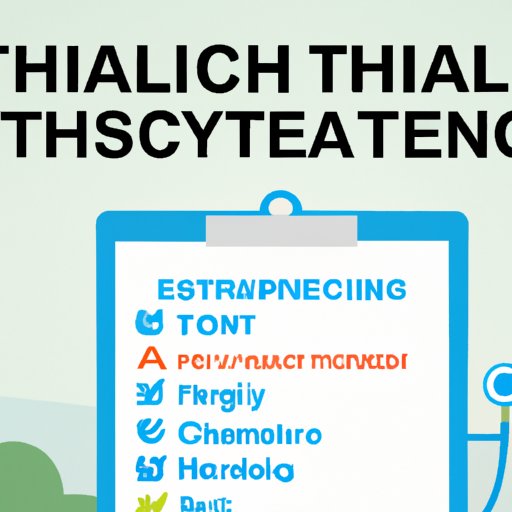Introduction
Health technology assessment (HTA) is a multidisciplinary field that evaluates the clinical effectiveness, safety, cost-effectiveness, and social implications of health technologies. The purpose of this article is to explore what health technology assessment is, how it works, and the impact it can have on healthcare systems, patient care, and the cost-effectiveness of new technologies.

Exploring the Role of Health Technology Assessment in Healthcare
HTA has become an increasingly important part of healthcare decision-making. According to a recent report from the Organisation for Economic Co-operation and Development (OECD), “HTA provides evidence to support governments, payers and other stakeholders in making informed decisions about the use of health technologies”.
HTA helps to inform healthcare decisions by providing evidence-based information about the safety and efficacy of different health technologies. This evidence can then be used to assess the cost-effectiveness of new technologies and to determine their potential impact on patient care.

An Overview of Health Technology Assessment: What It Is and How It Works
HTA is a process that involves evaluating the clinical effectiveness, safety, cost-effectiveness, and social implications of health technologies. There are several types of HTA, including economic evaluations, systematic reviews, and policy analyses.
The process of HTA typically involves the following steps:
- Identifying the health technology to be assessed
- Collecting and synthesizing relevant data
- Developing models to analyze the data
- Interpreting the results of the analysis
- Formulating recommendations based on the results

Examining the Benefits and Challenges of Health Technology Assessment
HTA can provide many benefits to healthcare organizations, such as improved decision-making, increased cost savings, and better patient outcomes. According to a study published in The Lancet, “HTA can improve decision-making by providing high-quality evidence and helping to identify gaps in knowledge”.
However, there are also some challenges associated with HTA. These include issues with data availability, standardization of processes, and the potential for bias in the results. As noted in a study published in BMC Medical Informatics and Decision Making, “HTA is limited by the availability of data, which can be incomplete or inconsistent”.
Understanding the Impact of Health Technology Assessment on Patient Care
HTA can have a significant impact on patient care by improving the quality and safety of treatments, reducing costs, and increasing access to new technologies. For example, a study published in BMC Health Services Research found that “HTA can help to ensure that the right patients receive the right treatment at the right time”.
However, there are also potential risks associated with HTA, such as the potential for bias in the results and the difficulty of assessing the long-term effects of a technology. As noted in a study published in The Lancet, “HTA is limited by the lack of long-term data on the safety and effectiveness of a technology”.
Evaluating the Cost-Effectiveness of New Technologies Through Health Technology Assessment
HTA can also be used to evaluate the cost-effectiveness of new technologies. Cost-effectiveness analysis (CEA) is a type of HTA that uses mathematical models to assess the cost-effectiveness of a technology. CEA can help to identify the most cost-effective option for a given healthcare situation.
For example, a study published in BMC Health Services Research found that “CEA can help to identify the most cost-effective option for a particular health problem or intervention”. CEA can also be used to compare different options and to determine the optimal combination of interventions.
Investigating the Limitations of Health Technology Assessment
HTA is not without its limitations. One of the major issues is the availability of data. As noted in a study published in BMC Medical Informatics and Decision Making, “HTA is limited by the availability of data, which can be incomplete or inconsistent”. Additionally, there are challenges with standardizing HTA processes across different healthcare settings.
Uncovering the Future of Health Technology Assessment
HTA is rapidly evolving and there are many trends that are likely to shape the future of HTA. As noted in a recent report from the OECD, “The rise of digital health technologies, such as artificial intelligence and machine learning, is expected to transform the way HTA is conducted”. Additionally, the report suggests that the use of HTA will continue to expand, as it is becoming increasingly important in healthcare decision-making.
The potential impact of HTA on healthcare systems is significant. HTA can help to reduce costs, improve patient outcomes, and increase access to new technologies. As noted in a study published in The Lancet, “HTA can help to ensure that health resources are used efficiently and that the most effective treatments are available to all patients”.
Conclusion
Health technology assessment is an important tool for healthcare decision-making. It can provide evidence-based information about the safety and efficacy of different health technologies, as well as help to evaluate the cost-effectiveness of new technologies. HTA can also have a significant impact on patient care, as it can help to ensure that the most effective treatments are available to all patients. Despite its potential benefits, there are also some challenges associated with HTA, such as the availability of data and the difficulty of standardizing HTA processes. Looking ahead, the use of HTA is expected to expand, as digital health technologies become more prevalent.
(Note: Is this article not meeting your expectations? Do you have knowledge or insights to share? Unlock new opportunities and expand your reach by joining our authors team. Click Registration to join us and share your expertise with our readers.)
